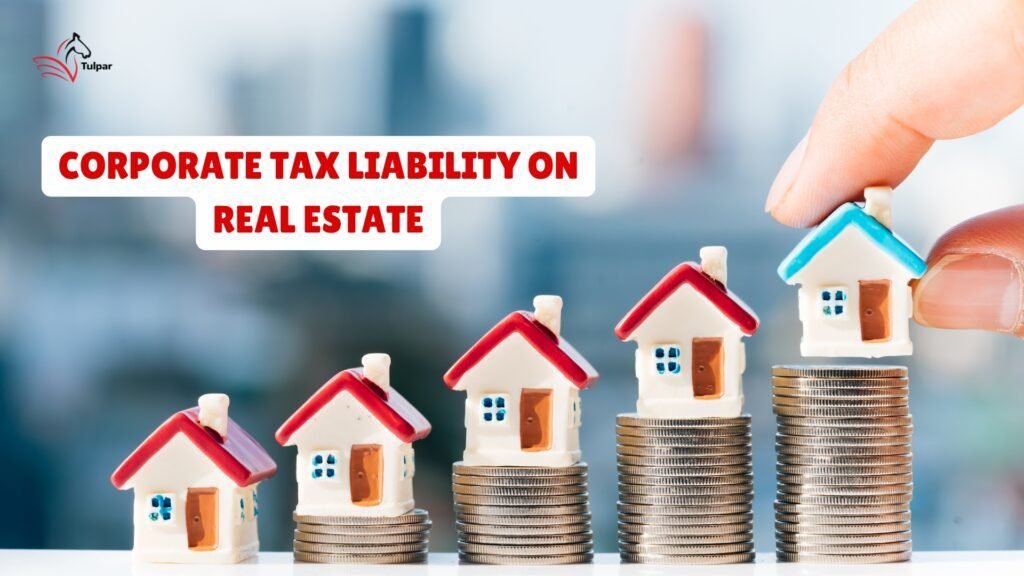
Corporate Tax Liability on Real Estate
Table of Contents
Related Articles


Sugar Tax Reform Will Crush Small UAE Drink Brands

The Impact of CARF on UAE Crypto Traders | Ready to Report FTA

Let's Talk
Sign Up For Free Consultation
CORPORATE TAX LIABILITY ON REAL ESTATE
Corporate tax liability on real estate investments in the UAE is an important topic for investors, developers, and businesses involved in the real estate sector. As of recent developments, the UAE introduced a corporate income tax, making income derived from real estate in the UAE subject to corporate tax. This includes income from immovable property and other property investments within the UAE. The introduction of the UAE corporate tax affects all businesses that generate taxable income from real estate in the UAE, including those that derive rental revenue or capital gains from property in Dubai and other emirates. To navigate these changes, companies must ensure they comply with the new regulations, understand the tax rate applied, and calculate their tax liability accurately.

Investors in the real estate businesses need to understand how income from real estate, including rental revenue, is taxed. In the UAE, income earned from property investment and other activities related to property in the UAE is now subject to corporate tax, which is calculated based on taxable revenue. The tax rate varies depending on the nature and scale of the business. Businesses must carefully assess their taxable income to determine the impact of the corporate tax. As a result, property investors must take proactive steps to plan and optimize their tax liabilities to ensure compliance with the new law.
Tulpar Global Taxation Services can help businesses understand and navigate the complexities of corporate tax in UAE. With their expertise, property investors can receive comprehensive guidance on how to handle tax liability related to income from real estate. Whether you are managing rental revenue, gains from property sales, or other forms of investment income, Tulpar Global Taxation Services can help ensure that your business meets all requirements under the UAE corporate tax law, minimizing risks and maximizing opportunities for growth in the real_estate market.
Unlocking Corporate Tax Secrets for UAE Real Estate

The introduction of corporate tax in the UAE represents a monumental shift for the real estate industry. This change has significant implications for real estate investors, especially those earning income from real estate through rental revenue or property investment income. With the corporate tax rate now applicable to both commercial real estate and residential properties, understanding the nuances of corporate tax in UAE is crucial for businesses involved in real estate.
For property investors, this means that any income obtained from business properties, residential properties, and real estate transactions will now be subject to taxation. Whether it’s income obtained from real estate or rental revenue, the tax outcomes need to be carefully considered to avoid penalties. The corporate tax rule applies to both direct earnings from properties and profits from selling or leasing real estate.
At Tulpar Global Taxation, we help businesses understand how the corporate tax rule impacts their operations in the UAE and create strategies to optimize tax liabilities. Our experts guide property investors in complying with these regulations and minimizing their tax burden.
How the New Corporate Tax Law Impacts Real Estate Investors in the UAE
The new business tax in the UAE impacts real estate investors by imposing a tax rate on income obtained from real estate activities. This includes earnings from lease income, the sale of properties, and even real estate investment income. The real estate corporate tax is not just limited to business properties but also extends to residential properties, requiring investors to consider the tax outcomes of their entire portfolio.
For example, properties located in different parts of the UAE may face different tax treatments. The corporate tax rate is applicable to income generated from real estate based on the type of property and its location, whether within mainland areas or special jurisdictions like free zones.
To ensure real estate businesses don’t face unexpected tax liabilities, it is crucial for them to be aware of the tax imposed to their real estate market activities. The corporate tax rule introduces significant changes, and property investors should seek professional advice from Tulpar Global Taxation to stay compliant with the new corporate tax rules.
What Every Real Estate Business Needs to Know About Taxation in the UAE
Every real estate business in the UAE, whether it deals in corporate properties, residential properties, or both, needs to be well-versed in the new busines tax regulation. The tax purposes of this law are clear: income from real estate activities will be taxed, including rental revenue, income derived from real estate, and any profits from property sales.
Real estate companies must evaluate their property investment income and ensure they are accurately reporting the income generated from real estate for taxation purposes. Understanding the impact of the tax rate is essential for making informed decisions about tax outcomes.
Businesses operating in real estate industry UAE should familiarize themselves with how the corporate tax applies to their property portfolio, including the tax implications for both commercial real estate and residential properties. To navigate these complexities and optimize their tax strategy, real estate businesses should partner with Tulpar Global Taxation, which offers specialized services to ensure compliance and efficiency.
Is Your Real Estate Business Ready for Corporate Tax?

As a real estate business, preparing for corporate tax is essential to avoid costly mistakes and ensure compliance with the corporate tax regulation. Whether your company deals with commercial real estate, residential properties, or both, it is important to take proactive steps in preparing for the corporate tax that applies to income obtained from real estate.
Preparing for Corporate Tax on Real Estate in the UAE: A Step-by-Step Guide
- Assess Your Property Portfolio: The first step in preparing for tax on real estate is to assess the property located in your portfolio. This includes determining which properties generate rental income or are involved in real estate investment income. Understanding how tax applies to both commercial properties and residential properties is essential.
- Understand the Tax Rate: The corporate tax rate for real estate activities may vary depending on the type of property, whether it is in a free zone or a mainland area. Real estate businesses need to be aware of these variations and plan accordingly.
- Ensure Proper Documentation: Accurate documentation is crucial for tax reporting. Make sure all income obtained from real estate is properly documented, including rental income, profits from property sales, and income obtained from real estate.
- Tax Planning and Strategy: Develop a tax strategy that optimizes deductions and identifies potential exemptions, such as those offered by free zones. It’s important to have a tax plan that aligns with the corporate tax rule and minimizes liabilities.
- Partner with Experts: To ensure compliance and optimize your tax strategy, partner with Tulpar Global Taxation, a trusted provider of tax services in the UAE. We can guide you through the complexities of corporate tax and help streamline your tax management.
Common Tax Mistakes Real Estate Companies Make—and How to Avoid Them with Tulpar Global Taxation
Real estate companies often make critical mistakes when dealing with tax on real estate, which can lead to penalties and lost opportunities for tax savings. Some common mistakes include:
- Misunderstanding Exemptions: Some businesses fail to take advantage of exemption from corporate tax benefits, especially those operating in free zones. Tulpar Global Taxation can help you understand if your business qualifies for these exemptions.
- Incorrect Classification of Income: Real estate businesses sometimes misclassify income obtained from real estate investment income or rental income, which can result in overpayment of taxes. We ensure that income is accurately reported according to tax purposes.
- Failure to Plan for Tax Liabilities: Not accounting for the full tax implications of owning and renting out corporate properties or residential properties can result in unanticipated tax bills. At Tulpar Global Taxation, we assist with long-term tax planning that keeps you ahead of any liabilities.
Understanding Corporate Tax Exemptions in Real Estate

The introduction of the new corporate tax in UAE has significantly impacted the real estate sector, but certain exemptions provide opportunities for real estate businesses to reduce their tax liabilities. Understanding these corporate tax exemptions is crucial for investors and developers to ensure they are in compliance with the law while maximizing potential savings. It’s essential to know who is exempted from corporate tax and how special regulations, such as those for free zones, can impact your tax obligations.
Who is Exempt from Corporate Tax in the UAE Real Estate Sector?
Certain entities operating in the real estate sector in the UAE may be excluded from corporate tax under specific conditions. Generally, these exemptions apply to businesses that meet certain criteria, such as those operating in free zones or those earning qualifying income. For example, businesses engaged solely in the exploitation of immovable property for the purpose of leasing or rental activities may qualify for exemptions from corporate tax.
Specifically, properties located in free zones or owned by businesses that focus on real estate management may be eligible for exemptions from the corporate tax on rental income. Additionally, income derived from real estate activities like leasing, and transactions involving real estate properties, may also benefit from special tax treatments depending on the nature of the activity and the geographical location of the property.
Understanding the tax treatment of the property is critical, as businesses that operate in areas or use assets outside the scope of the corporate tax purposes may avoid being subject to the tax rate. At Tulpar Global Taxation, we help property investors navigate these exemptions and ensure compliance with the UAE tax laws.
The Role of Free Zones in Real Estate Taxation
In the UAE, free zones play a pivotal role in the corporate tax on rental income and the tax on the rental income of real estate properties. Companies operating in these zones often enjoy attractive tax incentives, including the possibility of being excluded from corporate tax for a set period, typically 15-50 years.
The UAE free zones are designed to encourage foreign investment, particularly in industries like real estate. For instance, real estate businesses operating in these zones may not only be exempted from corporate tax but also benefit from full ownership rights and other advantages. However, it’s important to note that these exemptions are subject to specific regulations, such as how the corporate tax applies to commercial real estate or residential properties.
At Tulpar Global Taxation, we offer advisory services to help your real estate business understand the tax implications of operating in a free zone and ensure you are taking full advantage of available exemptions.
How Corporate Tax Affects Your Real Estate Profits

The imposition of corporate tax on real estate activities can significantly impact the profitability of your business. While the new corporate tax presents challenges, understanding how it affects real estate profits will help you make informed decisions and implement effective strategies to maintain strong returns.
Profitability vs. Tax Liabilities
When calculating the real cost of tax on real estate sales, it’s important to consider both tax liabilities and the impact on your bottom line. Income obtained from real estate sales, including both residential and commercial real estate, will now be subject to the corporate tax rate, which could affect profit margins.
For example, if your real estate business primarily generates income from commercial real estate or rental income, understanding the full scope of corporate tax on these sources is essential for calculating your net profits. Corporate tax on the income generated from property sales and leasing may reduce overall profitability unless proper tax planning strategies are in place.
By partnering with Tulpar Global Taxation, real estate businesses can implement strategies to optimize their tax obligations, ensuring that tax liabilities do not unduly affect profitability. We help you calculate the impact of corporate tax on the rental income and make adjustments to improve your bottom line.
The Corporate Tax Rate You Can Expect on Your Real Estate Income
The tax rate for real estate income in the UAE varies depending on the type of income, the location of the property, and whether your business qualifies for any exemptions. Generally, businesses subject to UAE corporate tax will face a rate of 9% on profits derived from real estate properties.
However, it’s important to note that some types of real estate income, such as income obtained from land or real estate property in free zones, may be eligible for reduced rates or exemptions. This means that businesses involved in leasing or managing corporate properties in free zones may benefit from lower tax rates or even total tax exemptions on their real estate income.
Understanding the specific tax rate that applies to your business is essential for making strategic financial decisions. Tulpar Global Taxation provides expert advice on the corporate tax on rental income and how to navigate the complexities of tax rates in the UAE’s real estate industry.
Corporate Tax Strategies for Real Estate Businesses in the UAE

For real estate businesses in the UAE, developing a tax strategy is crucial for maximizing tax efficiency and minimizing liabilities. Corporate tax can significantly impact the profitability of real estate companies, but with the right strategy, businesses can manage their tax obligations effectively.
Maximizing Tax Efficiency in Real Estate Deals with Tulpar Global Taxation
To maximize tax efficiency in real estate deals, businesses should focus on structuring transactions in a way that minimizes the taxable revenue subject to corporate tax purposes. This can include strategic planning for the tax treatment of the property and ensuring that any qualifying income is correctly classified.
For example, real estate businesses involved in commercial real estate or rental income may benefit from considering properties in free zones, where they can enjoy exemptions from corporate tax. By working with Tulpar Global Taxation, real estate companies can ensure they are taking full advantage of tax-saving opportunities and structuring their operations for optimal tax outcomes.
We provide tailored tax strategies for businesses involved in the exploitation of immovable property to help them navigate the complexities of corporate tax and ensure maximum tax efficiency.
How to Minimize Your Tax Liabilities in the Real Estate Sector
To minimize tax liabilities in the UAE’s real estate, businesses need to consider a range of factors, including property location, income type, and potential exemptions. Real estate businesses can reduce their taxable revenue by investing in real estate properties located in free zones or structuring their deals to qualify for corporate tax exemptions.
In addition, it’s important to understand the full scope of the tax treatment of the property, including how corporate tax applies to commercial real estate and residential properties. Strategic planning, accurate documentation, and proper classification of rental income are essential for minimizing corporate tax liabilities.
At Tulpar Global Taxation, we assist real estate businesses in structuring their operations and transactions to minimize their exposure to corporate tax and maximize tax savings. Corporate tax on rental income, and corporate tax on the income from real estate properties in the UAE can have a significant impact on the profitability of your business. By understanding corporate tax exemptions, tax treatment of the property, and utilizing effective corporate tax strategies, real estate businesses can navigate the new tax landscape and minimize their tax burdens. Partner with Tulpar Global Taxation to ensure your real estate business is fully compliant and tax-efficient in the face of these changes.
Avoiding Pitfalls in Corporate Tax for Real Estate Transactions
The introduction of corporate tax in UAE has had significant implications for real estate transactions. Real estate businesses, developers, and investors must understand the rate of real estate corporate tax and its potential impact on the profitability of their transactions. Whether you are owning and operating non-commercial real estate or engaging in the renting of real estate, it’s crucial to be aware of the corporate tax on the taxable income and tax treatment for business properties in order to avoid costly mistakes. By navigating these regulations correctly, you can ensure that your real estate transactions remain financially efficient and compliant with local tax laws.
The Tax Impact on Real Estate Transactions in the UAE
Real estate transactions in the UAE are now subject to UAE corporate tax under certain conditions. This includes transactions involving the buying and selling properties as well as the income attributed to commercial property. Businesses and individuals who own property in the UAE must now carefully assess how the tax on the income earned from these activities will apply.
For example, real estate will be liable for corporate tax if the turnover generated from renting of real estate exceeds a certain threshold, or if the business activities fall within the scope of corporate tax. However, transactions involving real estate located in a free zone may be eligible for exemptions or preferential tax treatment, depending on the nature of the business and the location of the property.
Moreover, transactions involving REITs in real estate market are also subject to specific tax implications, which can vary based on whether the transaction involves residential or business properties. To avoid unforeseen liabilities, it’s important to consult with Tulpar Global Taxation to fully understand the nuances of corporate tax as it applies to real estate transactions in the UAE.
Key Tax Considerations When Buying and Selling Properties in the UAE
When buying or selling real estate in the UAE, it’s important to consider various tax aspects that may affect the transaction. Key tax considerations include the tax on its UAE investments and the corporate tax on its UAE properties. For example, the tax on the taxable revenue derived from the sale of real estate properties will depend on whether the property is owned or operated as part of a commercial real estate business.
In addition, buyers and sellers need to factor in the corporate tax on their real estate holdings, especially when those properties generate significant income. Tax treaties between the UAE and other countries can also play a role in determining the overall tax liability, particularly for international investors or for properties that generate cross-border income.
Tulpar Global Taxation provides guidance to help real estate businesses and investors understand the tax treatment for business properties, including strategies for minimizing the tax burden during real estate transactions.
Your Real Estate Investment and Corporate Tax: What’s Next?

As corporate tax regulations evolve in the UAE, property investors must adjust their strategies to remain competitive and compliant. The corporate tax on taxable income generated from real estate activities may influence long-term investment strategies, particularly in terms of how properties are bought, sold, and managed. The changes to corporate tax rule will also impact individual investors looking to create personal wealth through real estate investments and maximize the profitability of their portfolios.
How Corporate Tax Law Changes Will Affect Your Real Estate Investment Strategy
The introduction of corporate tax on their real estate earnings represents a significant shift in the UAE’s tax policy, which will influence the attractiveness of the real estate industry for individual investors in UAE. For property investors, understanding how corporate tax on the taxable income from property sales and rental income will affect their returns is essential for future-proofing their investment strategies.
The rate of real estate corporate tax may vary depending on the nature of the transaction and the location of the properties. For example, properties located in a free zone or commercial properties may be subject to different tax rates compared to residential real estate. Investors will need to re-evaluate their portfolio and potentially shift their focus toward properties or investments that offer more favorable tax conditions.
At Tulpar Global Taxation, we specialize in providing property investors with actionable insights to navigate the evolving tax landscape. Our expert team can help you develop strategies to minimize your corporate tax liabilities and optimize your investment outcomes.
Future-Proofing Your Real Estate Business
To ensure your real estate business remains competitive and tax-efficient in the long term, it’s crucial to stay informed about the ongoing changes in corporate tax law and how they will impact your business activities. By working with a tax expert like Tulpar Global Taxation, you can future-proof your operations by adopting a forward-thinking tax strategy that minimizes exposure to tax liabilities while maximizing profitability.
We help real estate businesses owning and operating non-commercial real estate or commercial properties stay ahead of regulatory changes, ensuring they are well-positioned to thrive in a real estate market that is increasingly subject to corporate tax. Tulpar Global Taxation offers expert tax advice on structuring your real estate transactions, optimizing tax treatment, and identifying opportunities for tax exemptions and preferential rates.
In conclusion, the corporate tax on taxable revenue generated by real estate activities in the UAE requires careful planning and strategy. Property investors must understand the potential impact of corporate tax on transactions, including tax on their real estate holdings, and be proactive in adjusting their investment strategies accordingly. By partnering with Tulpar Global Taxation, you can mitigate tax liabilities, stay compliant with regulations, and position your business for long-term success in the UAE’s real estate market.
Yes, Corporate Tax may apply to real estate activities in the UAE depending on how the income is earned. Income from real estate businesses, such as property development, leasing as a business, or real estate trading, can fall within the scope of Corporate Tax. The tax treatment depends on the nature of the activity and the taxpayer’s status.
Generally, individuals earning rental income in a personal capacity are not subject to UAE Corporate Tax. However, if real estate activities are conducted as a business (for example, through a company or structured commercial activity), Corporate Tax may apply. Proper classification is essential to determine liability.
Companies engaged in real estate development, leasing, property management, or real estate trading are subject to Corporate Tax on their taxable profits. This includes income from sales, rentals, and related services. Allowable expenses can be deducted when calculating taxable income.
Free Zone real estate companies may qualify for a 0% Corporate Tax rate on qualifying income if they meet Qualifying Free Zone Person conditions. However, income from UAE Mainland real estate or non-qualifying activities may be subject to the standard Corporate Tax rate. Each activity must be reviewed carefully.
For companies, profits from the sale of property are generally subject to Corporate Tax. The treatment depends on whether the property is held as a capital asset or trading stock. Accurate accounting and intent documentation are important for correct tax treatment.
Yes, real estate businesses can deduct expenses incurred wholly and exclusively for business purposes. This may include maintenance costs, management fees, depreciation, and financing costs (subject to rules). Proper documentation is required to support deductions.
Corporate Tax and VAT are separate but interconnected. VAT applies based on the nature of the real estate supply (residential, commercial, or mixed-use), while Corporate Tax applies to profits. Inconsistencies between VAT and Corporate Tax reporting can trigger audits.
Yes, real estate holding companies may be subject to Corporate Tax on rental income or gains. Certain exemptions or reliefs may apply depending on structure and activities. Strategic structuring helps optimize tax exposure.
Common risks include incorrect classification of income, misunderstanding Free Zone benefits, and poor expense documentation. Many businesses also overlook Corporate Tax registration and filing obligations. These issues can lead to penalties and reassessments.
Effective management includes proper structuring, accurate accounting, regular compliance reviews, and timely filing. Working with experienced advisors like Tulpar Global Taxation helps real estate businesses assess exposure, remain compliant, and optimize their Corporate Tax position.
